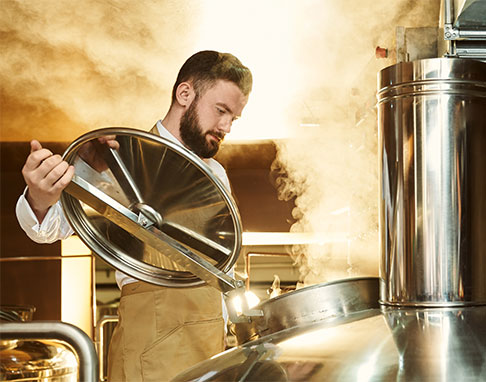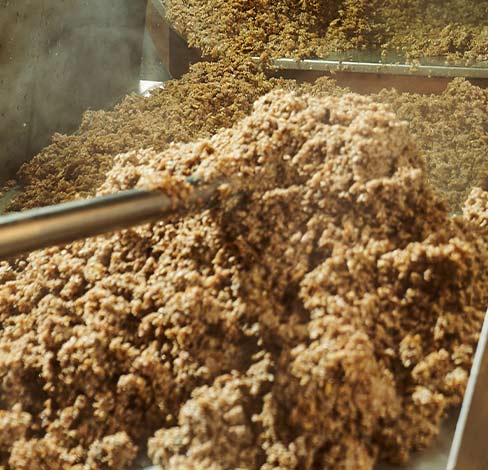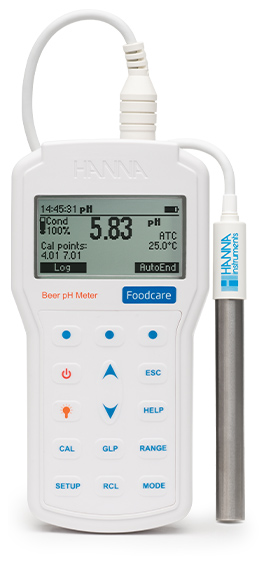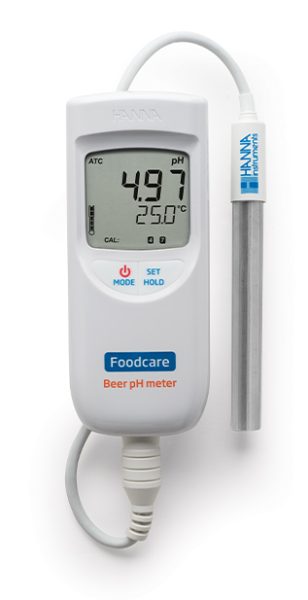Over the past 10 years, the number of homebrewers and microbreweries has grown tremendously. Often brewers start by using a malt extract to prepare wort that is boiled before starting the fermentation process with yeast. The malt extract is prepared from natural grains such as wheat and barley. Crushed grains that have been allowed to begin to germinate and dried in a kiln are known as malt. The malt is extracted by steeping in water at 60 to 70°C in a process known mashing. This is where the alpha and beta amylase enzymes are activated, converting the malted grains into fermentable sugars.


Over the past 10 years, the number of homebrewers and microbreweries has grown tremendously. Often brewers start by using a malt extract to prepare wort that is boiled before starting the fermentation process with yeast. The malt extract is prepared from natural grains such as wheat and barley. Crushed grains that have been allowed to begin to germinate and dried in a kiln are known as malt. The malt is extracted by steeping in water at 60 to 70°C in a process known mashing. This is where the alpha and beta amylase enzymes are activated, converting the malted grains into fermentable sugars.


The pH of mash is a critical parameter to monitor; it must be maintained between pH 5.2 and 5.6 for optimum enzyme activity. As the malted grains are broken down, organic acids are formed which can lower the pH of the mash. This can result in incomplete conversion of starch to sugar, as amylase activity decreases at a pH less than 5.2. Therefore, pH should be measured during the mash process and adjusted periodically if necessary because of the high temperatures of mash, the pH observed will vary greatly with temperature; this is an important consideration if using a pH meter without temperature compensation. A hot mash reads at a higher pH than a mash cooled to room temperature due to the variation in ion activity.
The pH of mash is a critical parameter to monitor; it must be maintained between pH 5.2 and 5.6 for optimum enzyme activity. As the malted grains are broken down, organic acids are formed which can lower the pH of the mash. This can result in incomplete conversion of starch to sugar, as amylase activity decreases at a pH less than 5.2. Therefore, pH should be measured during the mash process and adjusted periodically if necessary because of the high temperatures of mash, the pH observed will vary greatly with temperature; this is an important consideration if using a pH meter without temperature compensation. A hot mash reads at a higher pH than a mash cooled to room temperature due to the variation in ion activity.
Meters with temperature compensation will display a reading unaffected by the temperature of the sample, providing users with an accurate pH measurement.
For measuring pH value of mash in beer production
HANNA has several options!
HANNA has several options!
HI98167
Professional Beer pH meter
Designed to bring simplicity to pH testing during the beer making process, the HI98167 Professional Portable Beer pH Meter is engineered to withstand the tough environment of the brewery. The specialized probe features a titanium body, flat glass tip, and a cloth or fiber wick junction providing a larger surface area than a standard ceramic junction making it ideal for measuring the pH of mash or wort during the beer making process.
- ±0.002 pH Accuracy
- Comes with all the necessary solutions and batteries- everything you need to get started measuring right away.
- Specialized electrode for testing of mash and wort during the brewing process.
HI99151
pH Meter for Brewing
Designed to bring simplicity to pH testing during the brewing process, the HI99151 Beer pH Meter is engineered to withstand the tough environment of the brewery. The replaceable probe features a titanium body, flat glass tip, and a cloth or fiber wick junction providing a larger surface area than a standard ceramic junction. This is useful when measuring the pH of liquid samples with higher solids content such as mash, wort, or beer.
- ±0.02 pH accuracy
- Comes with all the necessary solutions and batteries- everything you need to get started measuring right away.
- Great for all brewers, from professional to home brewers!
FC2142
Wireless Beer pH Meter HALO®
Easily measure pH in mash, wort, and finished beer with the FC2142 Wireless Beer pH Meter. This HALO is designed for home and craft beer makers. The built-in electrode features a titanium body, flat glass tip, and renewable cloth junction making it ideal for measuring the pH of mash or wort during the beer making process. All readings are transmitted directly to your Apple or Android device or the edge®blu.
- Take laboratory grade pH and temperature measurements using your smart phone or tablet.
- HALO’s smart system tells you when your electrode needs cleaning or calibration.
- Great for any brewery, kitchen, or food laboratory.
Author:
Tajana Mokrović
mag.nutr.
Tajana Mokrović
mag.nutr.


With Great Product Come Great Results









